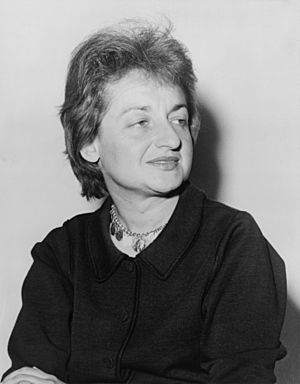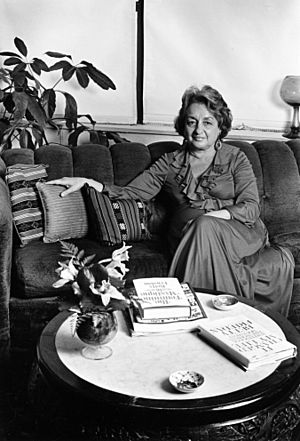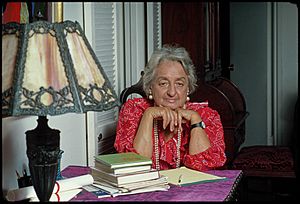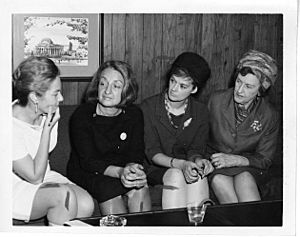Betty Friedan facts for kids
Quick facts for kids
Betty Friedan
|
|
|---|---|

Friedan in 1960
|
|
| Born |
Bettye Naomi Goldstein
February 4, 1921 Peoria, Illinois, U.S.
|
| Died | February 4, 2006 (aged 85) Washington, D.C., U.S.
|
| Education | |
| Occupation |
|
|
Notable work
|
The Feminine Mystique (1963) |
| Spouse(s) |
Carl Friedan
(m. 1947–1969) |
| Children | 3, including Daniel Friedan |
| Scientific career | |
| Influences | Simone de Beauvoir |
Betty Friedan (/ˈfriːdən, friːˈdæn, frɪ-/ February 4, 1921 – February 4, 2006) was an American feminist writer and activist. A leading figure in the women's movement in the United States, her 1963 book The Feminine Mystique is often credited with sparking the second wave of American feminism in the 20th century. In 1966, Friedan co-founded and was elected the first president of the National Organization for Women (NOW), which aimed to bring women "into the mainstream of American society now [in] fully equal partnership with men".
In 1970, after stepping down as NOW's first president, Friedan organized the nationwide Women's Strike for Equality on August 26, the 50th anniversary of the Nineteenth Amendment to the United States Constitution granting women the right to vote. The national strike was successful beyond expectations in broadening the feminist movement; the march led by Friedan in New York City alone attracted over 50,000 people.
In 1971, Friedan joined other leading feminists to establish the National Women's Political Caucus. Friedan was also a strong supporter of the proposed Equal Rights Amendment to the United States Constitution that passed the United States House of Representatives (by a vote of 354–24) and Senate (84–8) following intense pressure by women's groups led by NOW in the early 1970s. Following Congressional passage of the amendment, Friedan advocated for ratification of the amendment in the states and supported other women's rights reforms.
Regarded as an influential author and intellectual in the United States, Friedan remained active in politics and advocacy until the late 1990s, authoring six books. As early as the 1960s Friedan was critical of polarized and extreme factions of feminism that attacked groups such as men and homemakers. One of her later books, The Second Stage (1981), critiqued what Friedan saw as the extremist excesses of some feminists.
Contents
Early life
Friedan was born Bettye Naomi Goldstein on February 4, 1921, in Peoria, Illinois, to Harry and Miriam (Horwitz) Goldstein, whose Jewish families were from Russia and Hungary. Harry owned a jewelry store in Peoria, and Miriam wrote for the society page of a newspaper when Friedan's father fell ill. Her mother's new life outside the home seemed much more gratifying.
As a young girl, Friedan was active in both Marxist and Jewish circles; she later wrote how she felt isolated from the latter community at times, and felt her "passion against injustice ... originated from my feelings of the injustice of anti-Semitism". She attended Peoria High School, and became involved in the school newspaper. When her application to write a column was turned down, she and six other friends launched a literary magazine called Tide, which discussed home life rather than school life.
Friedan attended the women's Smith College in 1938. She won a scholarship prize in her first year for outstanding academic performance. In her second year, she became interested in poetry and had many poems published in campus publications. In 1941, she became editor-in-chief of SCAN (Smith College Associated News). The editorials became more political under her leadership, taking a strong antiwar stance and occasionally causing controversy. She graduated summa cum laude and Phi Beta Kappa in 1942 with a major in psychology. She lived in Chapin House during her time at Smith.
In 1943 she spent a year at the University of California, Berkeley on a fellowship for graduate work in psychology with Erik Erikson. She became more politically active, continuing to mix with Marxists (many of her friends were investigated by the FBI). In her memoirs, she claimed that her boyfriend at the time had pressured her into turning down a Ph.D. fellowship for further study and abandoning her academic career.
Writing career
Before 1963
After leaving Berkeley, Betty became a journalist for leftist and labor union publications. Between 1943 and 1946 she wrote for Federated Press and between 1946 and 1952 she worked for the United Electrical Workers' UE News. One of her assignments was to report on the House Un-American Activities Committee.
By then married, Friedan was dismissed from the union newspaper UE News in 1952 because she was pregnant with her second child. After leaving UE News she became a freelance writer for various magazines, including Cosmopolitan.
According to Friedan biographer Daniel Horowitz, Friedan started as a labor journalist when she first became aware of women's oppression and exclusion, although Friedan herself disputed this interpretation of her work.
The Feminine Mystique
For her 15th college reunion in 1957 Friedan conducted a survey of college graduates, focusing on their education, subsequent experiences and satisfaction with their current lives. She started publishing articles about what she called "the problem that has no name", and got passionate responses from many housewives grateful that they were not alone in experiencing this problem.
Friedan then decided to rework and expand this topic into a book, The Feminine Mystique. Published in 1963, it depicted the roles of women in industrial societies, especially the full-time homemaker role which Friedan deemed stifling. In her book, Friedan described a depressed suburban housewife who dropped out of college at the age of 19 to get married and raise four children. She spoke of her own 'terror' at being alone, wrote that she had never once in her life seen a positive female role-model who worked outside the home and also kept a family, and cited numerous cases of housewives who felt similarly trapped. From her psychological background she offered some answers to women desirous of further education.
Friedan asserted that women are as capable as men for any type of work or any career path against arguments to the contrary by the mass media, educators and psychologists. Her book was important not only because it challenged hegemonic sexism in US society but because it differed from the general emphasis of 19th- and early 20th-century arguments for expanding women's education, political rights, and participation in social movements. While "first-wave" feminists had often shared an essentialist view of women's nature and a corporatist view of society, claiming that women's suffrage, education, and social participation would increase the incidence of marriage, make women better wives and mothers, and improve national and international health and efficiency, Friedan based women's rights in what she called "the basic human need to grow, man's will to be all that is in him to be". The restrictions of the 1950s, and the trapped, imprisoned feeling of many women forced into these roles, spoke to American women who soon began attending consciousness-raising sessions and lobbying for the reform of oppressive laws and social views that restricted females.
The book became a bestseller, which many historians believe was the impetus for the "second wave" of the women's movement in the United States, and significantly shaped national and world events.
Friedan originally intended to write a sequel to The Feminine Mystique, which was to be called Woman: The Fourth Dimension, but instead only wrote an article by that title, which appeared in the Ladies' Home Journal in June 1964.
Other works
Friedan published six books. Her other books include The Second Stage, It Changed My Life: Writings on the Women's Movement, Beyond Gender and The Fountain of Age. Her autobiography, Life so Far, was published in 2000.
She also wrote for magazines and a newspaper:
- Columns in McCall's magazine, 1971–1974
- Writings for The New York Times Magazine, Newsday, Harper's, Saturday Review, Mademoiselle, Ladies' Home Journal, Family Circle, TV Guide, and True.
Activism in the women's movement
National Organization for Women
In 1966 Friedan co-founded, and became the first president of the National Organization for Women. Some of the founders of NOW, including Friedan, were inspired by the failure of the Equal Employment Opportunity Commission to enforce Title VII of the Civil Rights Act of 1964; at the Third National Conference of State Commissions on the Status of Women they were prohibited from issuing a resolution that recommended the EEOC carry out its legal mandate to end sex discrimination in employment. They thus gathered in Friedan's hotel room to form a new organization. On a paper napkin Friedan scribbled the acronym "NOW". Later more people became founders of NOW at the October 1966 NOW Organizing Conference. Friedan, with Pauli Murray, wrote NOW's statement of purpose; the original was scribbled on a napkin by Friedan. Under Friedan, NOW advocated fiercely for the legal equality of women and men.
NOW lobbied for enforcement of Title VII of the Civil Rights Act of 1964 and the Equal Pay Act of 1963, the first two major legislative victories of the movement, and forced the Equal Employment Opportunity Commission to stop ignoring, and start treating with dignity and urgency, claims filed involving sex discrimination. They successfully campaigned for a 1967 Executive Order extending the same affirmative action granted to blacks to women, and for a 1968 EEOC decision ruling illegal sex-segregated help want ads, later upheld by the Supreme Court. Divisive in the 1960s among women was the Equal Rights Amendment, which NOW fully endorsed; by the 1970s, women and labor unions opposed to ERA warmed up to it and began to support it fully. NOW also lobbied for national daycare.
NOW also helped women get equal access to public places. For example, the Oak Room at the Plaza Hotel in New York held men-only lunches on weekdays until 1969, when Friedan and other members of NOW staged a protest.
Despite the success NOW achieved under Friedan, her decision to pressure Equal Employment Opportunity to use Title VII of the 1964 Civil Rights Act to enforce more job opportunities among American women met with fierce opposition within the organization. Siding with arguments from the group's African American members, many of NOW's leaders accepted that the vast number of male and female African Americans who lived below the poverty line needed more job opportunities than women within the middle and upper class. Friedan stepped down as president in 1969.
In 1973, Friedan founded the First Women's Bank and Trust Company.
Women's Strike for Equality
In 1970 NOW, with Friedan leading the cause, was instrumental in the U.S. Senate's rejection of President Richard M. Nixon's Supreme Court nominee G. Harrold Carswell, who had opposed the 1964 Civil Rights Act granting (among other things) women workplace equality with men. On August 26, 1970, the 50th anniversary of the Women's Suffrage Amendment to the Constitution, Friedan organized the national Women's Strike for Equality, and led a march of an estimated 20,000 women in New York City. While the march's primary objective was promoting equal opportunities for women in jobs and education, protestors and organizers of the event also demanded the establishment of child-care centers.
Politics
In 1970 Friedan led other feminists in derailing the nomination of Supreme Court nominee G. Harrold Carswell, whose record of racial discrimination and antifeminism made him unacceptable and unfit to sit on the highest court in the land to virtually everyone in the civil rights and feminist movements. Friedan's impassioned testimony before the Senate helped sink Carswell's nomination.
In 1971 Friedan, along with many other leading women's movement leaders, including Gloria Steinem (with whom she had a legendary rivalry) founded the National Women's Political Caucus.
In 1972, Friedan unsuccessfully ran as a delegate to the 1972 Democratic National Convention in support of Congresswoman Shirley Chisholm. That year at the DNC Friedan played a very prominent role and addressed the convention, although she clashed with other women, notably Steinem, on what should be done there, and how.
Movement image and unity
One of the most influential feminists of the twentieth century, Friedan (in addition to many others) opposed equating feminism with lesbianism. As early as 1964, very early in the movement, and only a year after the publication of The Feminine Mystique, Friedan appeared on television to address the fact the media was, at that point, trying to dismiss the movement as a joke and centering argument and debate around whether or not to wear bras and other issues considered ridiculous. In 1982, after the second wave, she wrote a book for the post-feminist 1980s called The Second Stage, about family life, premised on women having conquered social and legal obstacles.
She pushed the feminist movement to focus on economic issues, especially equality in employment and business as well as provision for child care and other means by which both women and men could balance family and work.
Related issues
War
In 1968, Friedan signed the "Writers and Editors War Tax Protest" pledge, vowing to refuse tax payments in protest against the Vietnam War.
Influence
Friedan is credited for starting the contemporary feminist movement and writing a book that is one of the cornerstones of American feminism. Her activist work and her book The Feminine Mystique have been a critical influence to authors, educators, writers, anthropologists, journalists, activists, organizations, unions, and everyday women taking part in the feminist movement. Allan Wolf, in The Mystique of Betty Friedan writes: "She helped to change not only the thinking but the lives of many American women, but recent books throw into question the intellectual and personal sources of her work." Although there have been some debates on Friedan's work in The Feminine Mystique since its publication, there is no doubt that her work for equality for women was sincere and committed.
Judith Hennessee (Betty Friedan: Her Life) and Daniel Horowitz, a professor of American Studies at Smith College, have also written about Friedan. Horowitz explored Friedan's engagement with the women's movement before she began to work on The Feminine Mystique and pointed out that Friedan's feminism did not start in the 1950s but even earlier, in the 1940s. Focusing his study on Friedan's ideas in feminism rather than on her personal life Horowitz's book gave Friedan a major role in the history of American feminism.
Justine Blau was also greatly influenced by Friedan. In Betty Friedan: Feminist Blau wrote of the feminist movement's influence on Friedan's personal and professional life. Lisa Fredenksen Bohannon, in Woman's work: The story of Betty Friedan, went deep into Friedan's personal life and wrote about her relationship with her mother. Sandra Henry and Emily Taitz (Betty Friedan, Fighter for Woman's Rights) and Susan Taylor Boyd (Betty Friedan: Voice of Woman's Right, Advocates of Human Rights), wrote biographies on Friedan's life and works. Journalist Janann Sheman wrote a book called Interviews with Betty Friedan containing interviews with Friedan for The New York Times and Working Women, among others. Focusing on interviews that relate to Friedan's views on men, women and the American Family, Sheman traced Friedan's life with an analysis of The Feminine Mystique.
Friedan (among others) was featured in the 2013 documentary Makers: Women Who Make America, about the women's movement.
In 2014, a biography of Friedan was added to the American National Biography Online (ANB).
Personality
The New York Times obituary for Friedan noted that she was "famously abrasive", and that she could be "thin-skinned and imperious, subject to screaming fits of temperament".
Media focus would fall on feminists grading each other on personality and appearance, the source of Betty Friedan and Gloria Steinem's well-documented antipathy. In February 2006, shortly after Friedan's death, the feminist writer Germaine Greer published an article in The Guardian, in which she described Friedan as pompous and egotistic, somewhat demanding and sometimes selfish, citing several incidents during a 1972 tour of Iran.
Indeed, Carl Friedan had been quoted as saying "She changed the course of history almost singlehandedly. It took a driven, super aggressive, egocentric, almost lunatic dynamo to rock the world the way she did. Unfortunately, she was that same person at home, where that kind of conduct doesn't work. She simply never understood this."
Personal life
She married Carl Friedan (né Friedman), a theater producer, in 1947 while working at UE News. She continued to work after marriage, first as a paid employee and, after 1952, as a freelance journalist. The couple divorced in May 1969, and Carl died in December 2005.
Carl and Betty Friedan had three children, Daniel, Emily and Jonathan. She was raised in a Jewish family, but was an agnostic. In 1973, Friedan was one of the signers of the Humanist Manifesto II.
Death
Friedan died of congestive heart failure at her home in Washington, D.C., on February 4, 2006, her 85th birthday.
Papers
Some of Friedan's papers are held at the Schlesinger Library, Radcliffe Institute, Harvard University, Cambridge, Massachusetts.
Awards and honors
- Honorary doctorate of humane letters from Smith College (1975)
- Humanist of the Year from the American Humanist Association (1975)
- Mort Weisinger Award from the American Society of Journalists and Authors (1979)
- From 1981 to 1983, Bonnie Tiburzi put on three “Women of Accomplishment” luncheons for the Wings Club honoring certain women, including Friedan.
- Honorary doctorate of humane letters from the State University at Stony Brook (1985)
- Eleanor Roosevelt Leadership Award (1989)
- Honorary doctorate of humane letters from Bradley University (1991)
- Induction into the National Women's Hall of Fame (1993)
- Honorary doctorate of letters from Columbia University (1994)
- "The 75 Most Important Women of the Past 75 Years" – Glamour magazine listed Friedan as one of them (2014)
In media
Friedan was portrayed by actress Tracey Ullman in the 2020 FX limited series Mrs. America.
Friedan was portrayed in Season 1 Episode 7 of the HBO Max series "Julia". The scene, which takes place at a Public Television gala in New York, depicts a conversation between Friedan and Julia Child, in which Friedan criticizes Child's cooking show on WGBH, suggesting that it harms women.
Books
- The Feminine Mystique (1963)
- It Changed My Life: Writings on the Women's Movement (1976)
- The Second Stage (1981)
- The Fountain of Age (1993)
- Beyond Gender (1997)
- Life So Far (2000)
See also
 In Spanish: Betty Friedan para niños
In Spanish: Betty Friedan para niños




